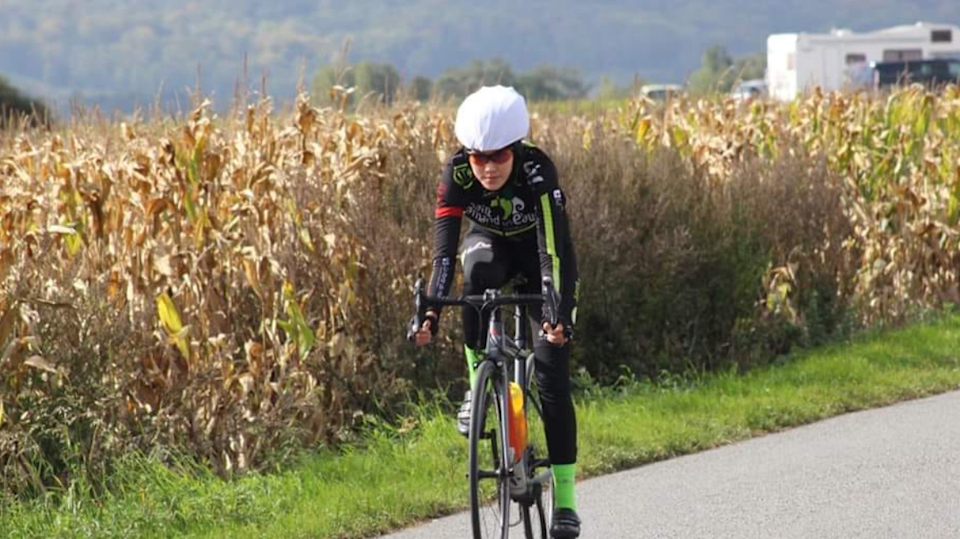Masomah Ali Zada: The Little Queen of Kabul
A TV documentary alerted a retired French lawyer to Ali Zada and her family's plight in Afghanistan. Now she is targeting Tokyo 2020.

Masomah Ali Zada escaped Afghanistan to pursue her cycling dreams.
Now she is targeting Tokyo 2020 as part of the second IOC Refugee Olympic Team.
As a member of the Hazara minority in Afghanistan, her life was already difficult.
But it became unbearable when she and a group of women - including sister Zahra - were threatened and targeted when they starting cycling competitively.
In 2017, the siblings were granted asylum in France where they have been able to train without fear and study at university.
Having received an IOC Refugee Athlete Scholarship, Masomah is determined to try and make the Games this summer.
"By taking part in the Olympic Games, I want to convince those who think a woman on a bicycle is inappropriate or find it strange that a Muslim woman wearing a headscarf is a cyclist that no, it's normal.
"I want to show that women are free to do whatever they want." - Masomah Ali Zada talking to Paris Match
Masomah Ali Zada's Tour de Force
Masomah spent her early childhood in Iran with her family exiled there while the Taliban ruled Afghanistan.
It was there that she and her sister were taught to ride a bicycle by her father.
They returned home in the mid-2000s with Masomah going to high school and excelling in taekwondo before falling in love with cycling despite women riding in public being frowned upon by conservative Afghans.
Speaking to AP in February 2016, she said, "One day, cycling has to become a tradition. So the Afghanistan female national cycling team wants to introduce cycling as a normal and common tradition to all other Afghan girls."
That wish has not become a reality as yet.
A 2016 Arte TV documentary entitled 'Les Petites Reines de Kaboul' ('The Little Queens of Kabul') showed the team training in the Afghan capital despite being threatened by those who believe women cycling is immoral.
In it, Masomah was deliberately hit by a car - the driver taunting her afterwards - with she and her colleagues and coach receiving death threats.
Retired lawyer Patrick Communal was moved by their plight and managed to contact the sisters via the Afghan Cycling Federation on social media.
According to Paris Match, he spoke to Masomah who told them she and her sister had been invited by the French Embassy to compete in a race in the south of France on International Women's Day, 8 March, 2016.
Communal met the pair afterwards, who told him they were being put under pressure by their community to stop cycling and be married.
They returned to Afghanistan, but he applied for a humanitarian visa for the family which was eventually granted a year later.
He then put them up in his holiday home in Brittany with, according to France24, retired teachers took turns to give them French classes and neighbours left gifts of local vegetables and flowers on the window sill.
As Communal successfully obtained asylum for the family, enabling them to stay in France permanently, son Thierry became their coach.
The Ali Zada sisters and another 'Petite Reine', Frozan Rasooli, were able to enrol at the University of Lille as part of a special programme for refugees.
Masomah is currently in her second year studying civil engineering and competing in races in northern France as she builds towards her Olympic dream.
The trio are based in Lille with the Ali Zada family now settled in Orleans.
Masomah also addressed the 2019 International Sports Association (AIPS) Congress in Lausanne about her efforts to make cycling seen as normal in her home country.
In June that year, she was awarded a Refugee Athlete Scholarship which provides her with travel expenses to compete in France and abroad, and the chance to represent the IOC Refugee Olympic Team in Tokyo. In June 2021, she was named as one of the 29 athletes chosen to represent the ROT for the Games.
Masomah has even hosted an Airbnb experience where she tells her story along with cooking the Afghan food Mantus.
She describes them as like ravioli and made food part of her experience because, "I have gone through many challenges whether in my life or in sport. One of the things I learned from these experiences is that being able to share a meal with family and friends is one of the most precious things."
The pandemic interrupted Masomah's training, and she was also affected by the news of the death of former coach, Abdul Sadiq Sadiqi, who was president of the Afghan Cycling Federation and accompanied 'Les Petites Reines' to France four years previously.
His passing has served as an inspiration to Masomah who was able to resume competitive riding in July.
She told Paris Match, "When I return to Afghanistan, I will organise a great cycling race for women and for men. It will bear the name of Abdul Sadiq Sadiqi.
"As an Afghan saying goes: 'They can kill all the swallows, but they cannot prevent the coming of spring.'"
